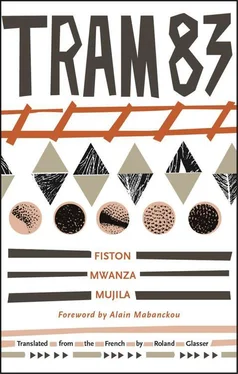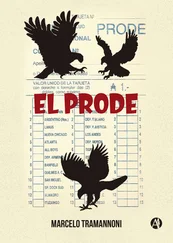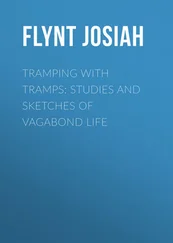“I want my tip, sir.”
“Allowing that I accept this text, with its ten characters, don’t you see how they lurch between the lines?”
“Not too cooked, those kidneys.”
“If you don’t give us a little money, we’ll stay right here!”
“Hey little one, your bosom’s making me lurch, ain’t that so Lucien?”
“Tip.”
Imagine the atmosphere: the pantyless-girlies, the busgirl, Lucien, the publisher, the laughter of the surrounding diggers, and the murmuring of a row of baby-chicks by the mixed restrooms, hanging on the rails of our famous Diva.
“But sir, you’ve not even read the text and you’re passing judgment on it.”
“Listen, my man, your characters don’t seem like they can hold it together on stage!”
“You’re already thinking about the staging?”
“They’re not very believable, they’re ashamed of existing. They shun us. I’m not saying there’s no text …”
“Give us a hundred.”
“Tip …”
“Is it about you, that thing?”
“That’s where we should be starting from. Look, you haven’t even read it yet and already you’re —”
“Listen, Lucien …”
“With respect, sir, your remarks are out of place, I mean really! The story takes place in a station. The play is divided into platforms. There are ten platforms, so ten tableaux. Ten characters who don’t know each other are waiting for a single individual. Actually, one might say that they know each other through a third party. And the whole play builds with their plans, dreams, memories, sympathies, and hatreds vis-à-vis the guy who’s coming.”
“Tip …”
“I’m not that keen on the plot and the characters. Or maybe if you extend to twenty characters for greater visibility.”
“Sir …”
“Gentlemen, we’ve got what it takes to give you crazy pleasure.”
“I’m saying that your text will corrode the train tracks and the history of the first mine. Literature is something other than what you see. People are fed up with this kind of drivel. We know everything about trains, so go take shelter from your inspiration.”
“I thank you for everything, dear sir.”
He got up, to the delight of the baby-chicks who saw him as a potential client.
“I’ve got a proposition for you, a different proposition.”
“Meaning?”
“Africa is of no interest to many intellectuals; let’s just say it’s not as exotic as it was four hundred years ago. My proposition is that you resubmit this same text to me but with the action taking place in Colombia. FARC, the jungle, you see what I mean? Take that as your context. Set the story in the jungle.”
“If you’re done, Lucien, I’ve gotta chat with this guy. You’re not going to make us hang about just for literature? Wow, you (addressing the publisher), I didn’t know that under your pith helmet you dwelled so much on …”
“Recreate the same characters; they need a heart in order to walk. Write with your guts. Invest in their trials and tribulations. Imagine some orgy scenes. Make their lives burlesque and realist at the same time: to strike the right balance, in a purely Colombian context.”
“I see what you mean. But what do I do with this text?”
“You’re a writer and you’re asking me what you should do with your text?”
He thought about his friend, Porte de Clignancourt, who ranted and raved each time because Lucien was lagging behind with his writing, while the guy exhausted himself making contacts with Paris theaters. Fair enough, but had anybody forced him into exile? Had anybody asked him to go study astrology? Does it serve any purpose in a country where you only eat every two days? After his glittering university achievements, the guy found himself joining the ranks of the unemployed, like ninety percent of the Republic’s population. A few months of resourcefulness later, he succeeded in reaching Europe. His older sister was sleeping with a renowned musician. Which brought its perks, apparently. She had a go at her lover to give her brother a job. Unfortunately, the latter was ill-suited to singing or handling a musical instrument. Finding himself in a tight spot, he begged the brother-in-law to take him along to try his luck in the north. Since he was going on tour, the brother-in-law brought the astrologer into his band, ostensibly as a saxophonist. A big black guy, dreadlocks, baritone saxophone slung over his shoulder, and a delicately expansive laugh to boot: the airport police didn’t see anything out of place.
The astrologer sang and played djembe in a metro station. Singing and playing djembe is an overstatement. It was sickening. He sang grossly out of tune and chafed his palms from striking the instrument. Given that certain tender souls consider reason to be always Hellenic and emotion eternally Negro, or, more explicitly, that any black guy with dreadlocks is an excellent artiste, the passersby stopped, applauded, and chucked him some coins which allowed him to phone Africa and mend his spirit with the aid of wine costing one euro fifty centimes a bottle. It was very possible he’d been drunk when he barked down the phone. True he had lent Lucien a hundred dollars for his wedding to Jacqueline but that was not a valid reason to continue harassing someone. Moreover, Lucien had long since reimbursed him.
“Gents, I take my leave of you.”
Requiem set to chewing the fat with one of the baby-chicks.
“Listen, Lucien, if you’ve got a bit of time to spare, produce a collection of poems on Mauritania too. It’s publishable, is Mauritania. Oh, the Mauritanian imagination!”
He hunched over, wrote: “The girls are like the mines which are like the railroads which are like the diggers which are like the students with their strike lacking timed longevity which are like their necktie-less pasts, an endangered species. But I admire the gaze with which they perceive life and death.”
“Yes.”
“Do you have the time?”
“Free verse on Mauritania.”
“I’ll see. Sir, I take my leave of you. The Diva and I will be performing together soon. We would welcome your presence.”
“Love me forever.”
“Take me to your country and love me more than your children.”
The publisher raised his eyebrows!
“Stop trying to get in that kid’s skirt.”
He left with his pages of texts. On his heels, a stream of young ladies, but not all of them. The publisher stuck his hand in the air:
“Rum!”
Requiem, to the single-mamas who’d stayed put:
“Come!”
They headed toward the mixed restrooms.
They crossed the threshold. Mewing. Crescendo. Extended mewing. In the Diva’s railroad crucible. Ephesians 18.
THE DEPARTURE OF THE NEGUS.
Requiem said he worked in the health sector, but there wasn’t a single living person in the City-State who knew what he was really involved in, outside of kidnappings and incursions in the Polygon. He always returned with a considerable sum of money that he spent all night counting and packing away in garbage bags. Sometimes he came back bleeding like a sponge. Sometimes he showed up virtually naked. And one night he even interrupted Lucien’s sleep:
“You know that I owe a Greek ship-owner $5,765,000 in two mornings’ time. What to do? He swears he’ll have my hide.”
But what the hell was Requiem up to with that kind of money? He’d never been seen in a three-piece suit, nor driving a carriage, nor straddling a mount, nor approaching the daughters of the thirty-odd consuls on which the whole burg, including our Mexican, South Ossetian, Pakistani, Belgian, French, Indochinese, Hungarian, Romanian, Chilean, Canadian, Ukrainian, and Tibetan brothers, most of them undocumented or holding a work permit illicitly obtained, had their eye.
Читать дальше












